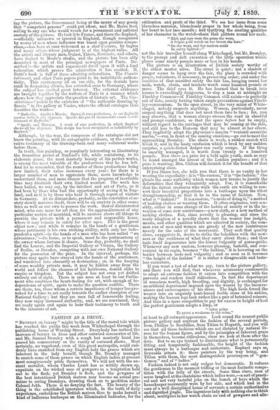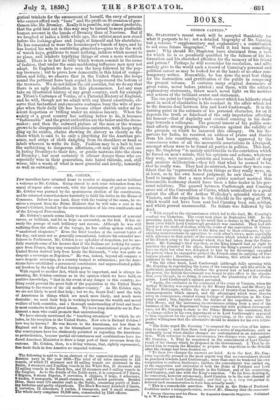FASHION AS A DECOY..
" BROMLEY on luxury" might be the title of the moral tale which has reached the public this week from Whitechapel through the publishing house of Worship Street. Everybody has noticed the increase of luxury in dress and other outward accessories of life, and Mr. Samuel Bromley with a rough but masterly hand has passed his commentary on the vanity of outward shows. Most certainly, no vagabond, even of this great metropolis, could sud- denly have snatched from any English lady the graces which are inherent in the lady herself, though Mr. Bromley managed to snatch some of those graces on which English ladies at present most conspicuously pride themselves. We will not with the an- cient moralist, whom Charles Lamb has so wittily shown up, expatiate on the wicked uses of gewgaws as a temptation held out to the flesh; yet Bromley is flesh, and the gewgaws of the best intentioned. British matron may become an actual pre- mium to erring Bromleys, drawing them on to perdition under Colenel Jebb. There is no denying the fact. The beauty of the thing is the established ignorance which, in the teeth of daily experience, emboldens the British matron thus to make herself a kind of ludicrous burlesque on the Illuminated Indicator, for the
edification and profit of the thief. We see her issue from some blameless mansion, blamelessly proper in her whole being from her heart to her lace mantle ; and typifying the sterling qualities of her character in the watch-chain that glitters round her neck.
" Rich and rare were the gems she wore, A bright gold watch on her breast she bore." " On she went, and her matron smile
In safety lighted—"
not the fair traveller herself along Whitechapel, but Mr. Bromley, to the prompt and deft execution of the little operation which places some ninety pounds more or less in his hands. The picture is an illustration of British society worthy of the oldest master alive. The street is quiet ; not a shadow of danger seems to hang over the fair, the place is crowded with people, volunteers, if necessary, in preserving order; and under the sunshine of that manifest safety the fair has, hanging round her neck, watch, chain, and trinkets worth some hundred pounds or more. The thief eyes it. He has learned that to break into i
houses s exceedingly dangerous, to step a man at midnight on Fmchley Common—if Finchley Common still exists—is perfectly out of date, society having taken ample precautions against Finch- ley-commonism. In the open street, in the very midst of White- chapel, nobody suspects anything. Women, particularly, never suspect anything that does not meet them face to face ; for, you may observe, that a woman always crosses the road. in cheerful and prompt confidence, so that the space before her be empty, without regard to the carriages that may be coming at the side, and still less to the Hansom that may be almost at her elbow. They implicitly adopt the physician's maxim " venienti occurrite morbo,"—run in front of the coming omnibus,—go out to meet the approaching Bromley. The chain is weak, a sudden snatch will break it, and in the hasty confusion which is bred by any sudden surprise, a quick-footed dodger can easily escape. If the thing be smartly managed, it is worth from twenty to a hundred pounds. Now there is a prize for a bold agile youth, such as may be found amongst the lowest of the London populace ; and if a prize is wanting, Mrs. Clifton will furnish it for the benefit of that enterprising class. If you blame her, she tells you that there is no vanity in her wearing the superfluity : it is "the custom," it is "the fashion." She pleads the same authority which women now invoke to justify the deformities that they voluntarily adopt. For, it is remarkable that the fairest creatures who walk the earth are willing to con- vert their beautiful proportions into a burlesque upon the vilest draughtsmanship, so that it be in the name of fashion. Now, what is "fashion?" It is a custom, "a mode of doing it," a method of making clothes or wearing them. It often originates, very sen- sibly, either in some change of the habits of society or in the in- vention of some new contrivance—a new cloth, or a new method of making clothes. But, since novelty is pleasing, and since the ready adoption of a novelty shows that the wearer has insight, means, and other qualities which are admired in society, the com- mon run of men and women are greedy of the new contrivance merely for the sake of the nouveaute. They seek that quality alone, exaggerate it, desire to strike the beholders with the new- ness or the costliness of what they carry about them; and thus taste itself degenerates into the lowest vulgarity of purse-pride. Whenever any new custom, however pleasing, tasteful, and con- venient in its orgin, becomes "the fashion," it is hovering on the border between taste and vulgarity ; and as soon as it becomes "the height of the fashion" it is rather a disagreeable and taste- less caricature.
If you want a test of what we say, turn to the picture gallery, and there you will find, that whenever aristocracy condescends to adopt an extreme fashion it enters into competition with the parvenu and renders itself ridiculous. In fact the deportment of conscious worth, high breeding, and dignity, is exchanged for an artificial deportment imposed upon the wearer by the inconve- nience and extravagance of his dress. The high heels forced the wearer into an ungainly bent-kneed feeble cross of his ankles, making the human legs look rather like a pair of botanical scissors. And thus in a mere competition to pay for excess in height of heel the perfect gentleman adopts a limp, or
"takes pains To prove a weakness in the reins,"
at least to all outward appearance. Look round the nearest public picture gallery and contrast the fashion of the several periods, from Phidias to Roubillac, from Titian to Hogarth, and you will see that all those fashions which are not dictated by natural fit- ness for the human figure, and by the principles of inherent grace in themselves, become ridiculous, since we look at them after the date. But to an eye trained to discriminate what is permanently fitting and temporarily fashionable, the height of the fashion must always be a burlesque and caricature. Raphael says so, Reynolds attests it : these painters by the way being, and Titian with them, the most distinguished pourtrayers of " gen- tlemen " and of "ladies."
Fashion indeed is not only vulgar but democratic. It reduces the gentleman to the meanest trifling or the most fantastic compe- tition with the folly of the streets. Some time since, men of sense laughed at the chatelaine which ladies wore,—a sort ofpracti- cal and not very tasteful joke on the bunch of keys which the housekeeper necessarily wore by her side, and which had in the ears of a well disciplined house of servants a certain authoritative and dignified jingle. The ingenious lady with nothing else to think about, multiplies in her watch chain no end of gewgaws and elle- gorical trinkets for the amusement of herself, the envy of persons who cannot afford such "luxe" and the profit on fit occasion of gen- tlemen like Mr. Bromley. Really it is possible, nay almost probable, that the gold laid out in this way may be turned to more profitable human account in the hands of Bromley than of Narcissa. But if we laughed at ladies a little while ago, the satirist must now stand before the looking-glass and laugh at himself and his chatelaine. He has consented to wear the housekeeper's bunch of keys, and he has busied his wits in contriving gimcracks—guns to do the work of watch keys, gridirons to roast nothing, ladders which mount to no place, and trinkets typifying things of even a more worthless kind. There is in fact no folly which women commit in the name of fashion, that under the same maddening influence men may not adopt. In England we have seen the hoop followed by the peg- top trowsers ; but to prove how democratic is this kind of compe- tition and folly, we observe that in the United States the hoops round the petticoat have been copied in hoops round the bottom of the trowsers. We do not follow the old moralist, but we do say that there is an ugly indication in this phenomenon. Let any man take an illustrated history of any great country, such for example as Titian's Costumes of Venice, or a Pictorial History of England, and he will, though not we admit with any literal exactitude, ob- serve that fantastical and excessive costumes busy the wits of peo- ples when their daily life has become either slavish under an in- solent despotism or trifling under an aimless luxury. When the society, of a great country has nothing better to do, it becomes "fashionable" and the great authorities are the tailor and the dress- maker ; and then the outward picture of the man or the woman grows to be disagreeable and ridiculous caricature, with hoops trip- ping up its ankles, chains showing its slavery as clearly as the chain which is said to be only a plaything for the Austrian pri- soner, and strips of cloth dangling from its shoulders or head as labels whereon to write its folly. Fashion may be a bait to lure the unthinking to dangerous affections,—it may aid the evil one in luring Bromleys to their fate, or gentle matrons into the claws of Bromley ; but most certainly it oftener decoys those who are especially wise in their generation, into hated ridicule, and, still worse, into a waste of what is most graceful and lovely, inwardly as well as outwardly.



























 Previous page
Previous page